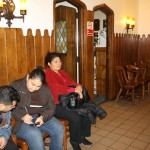This is the second report in a special two-part series on domestic violence in immigrant communities by Feet in Two Worlds reporters. Click here to read the first article.

Milagros, an undocumented migrant, is one of thousands of women with children who received help at the De Colores shelter in Phoenix this year. (Photos: Valeria Fernández)
PHOENIX, Arizona — The back of Milagros’ head hit the steps. Her three-year-old daughter stood by the door as her husband dragged Milagros up the stairs. Milagros, 41, had endured a decade of abuse by her husband. But when her daughter witnessed it, she knew it had to end.
She was almost homeless for three years until she found De Colores, a domestic violence shelter in Phoenix that specializes in helping undocumented Spanish-speaking migrant women like her.
“If I had had the information before, I would have left him earlier,” she said.
De Colores, the only bilingual and bi-cultural shelter for battered immigrant women and their children in Maricopa County, has 58 emergency beds. Given the need -about 500,000 undocumented immigrants live in Arizona, most in the Phoenix metropolitan area- there’s a drastic shortage of bilingual domestic violence shelters.
“We’re always full. When women are calling us we have to deny services because of lack of space,” said Maribel Castro, clinical supervisor for the shelter. This year they had to refer 1,096 women fleeing abusers to other shelters.
The problem: many of those shelters don’t have Spanish-speaking caseworkers available all the time, who are culturally sensitive to the needs of migrant women.
“We have heard that shelters are struggling with providing bilingual advocates and struggling with taking in monolingual women,” said Allie Bones, director of the Arizona Coalition Against Domestic Violence,an organization that lobbies for domestic violence funding in the state legislature.
De Colores is unique in serving migrant women, many of whom speak only Spanish. About 60 percent of its clients are Mexican immigrants, like Milagros, and overall 95 percent are Latinas.
Since last fiscal year, demand for legal advice and other services has doubled at De Colores, which also has the highest occupancy rate–98 percent–of all shelters in the state. During fiscal year 2008-2009, De Colores received 2,147 calls requesting shelter, legal aid and other types of domestic violence related services.
But funding is running dry due to the state’s ongoing $2 billion budget deficit. Domestic violence shelters in Arizona have seen state support cut by an average of 18 percent. De Colores has not received any help from the American Recovery and Reinvestment Act, which includes funds for domestic violence programs to offset state cuts during the recession.

De Colores, the only bilingual and bicultural shelter in Maricopa County that serves immigrant women, is facing a drastic shortage of space and funding cuts.
“If we cannot replace the funding, we’ll have to eliminate some of the services,” said Dottie O’Connell, director of residential services at Chicanos por la Causa, the local nonprofit that runs De Colores. “The women will receive the bed and the food, but then their children won’t receive vital services that protect them.”
Domestic violence affects all segments of the population and it isn’t more prevalent among migrant women, several studies have shown.
But battered migrant and refugee women are murdered at higher rates than their counterparts. A recent review of literature nationwide by the Family Violence Prevention Fund found that while non-fatal intimate partner violence may be lower for Latinas, they’re at a higher risk of homicide than U.S.-born women. The report suggests this higher rate may shed light on the inadequate response by institutions to this population.
De Colores’s Castro said that due to cultural reasons in their country of origin, some women are reluctant to go to shelters because they associate it with the idea of hiding and being isolated from their community. She added that the culture of “machismo” in Latin countries and generational gaps often send the message to women that they need to endure the abuse from their husbands or partners.
“I never had support from anyone in my family,” said Milagros. “I was always told I had to put up with anything from my husband: beatings, humiliations.”
Listen to Milagros (in Spanish)
[audio:http://feet2worlds.centernyc.org/Milagros.mp3]
“My mother used to say, and even now she says it: ‘Today they get to yell at once and they’re getting a divorce.’ But we’re not masochistic, we’re human beings. We have dignity and respect. We’re not supposed to be mistreated by anyone, no one has the right to touch us and much less our daughters.”
The current crackdown on illegal immigration by Maricopa County Sheriff Joe Arpaio has also increased fear among undocumented women about contacting the police to report crimes, according to shelter officials.
While De Colores doesn’t have statistics to prove it, they say from the phone calls they receive they can tell that the fear of deportation has increased. There have been instances where police have arrested a victim when she’s trying to defend herself. Undocumented women face a good chance of deportation once they enter one of the county jails that currently operate under an immigration enforcement agreement with federal authorities.
Kathy Gómez, a legal counselor for De Colores has received letters from victims in the county jails who are asking for help after their arrest.
Listen to Kathy Gómez
[audio:http://feet2worlds.centernyc.org/KathyGomez.mp3]
“It’s very difficult. One of the biggest things is the fear. The fear of getting deported, that police won’t pay attention. There’s been a number of occasions, -I know that it might sound bad from what I’m saying, but we’ve seen it- in which they come and instead of arresting the abuser, they arrest the victim or they arrest both. And they end up being deported. Why? Because the question is: Do you have an ID from Arizona? If the answer is no, they get arrested. So there’s a bigger fear to call, or if they call, the abuser and themselves gets deported. Therefore, we’re seeing an increase on those types of phone calls (to the shelter).”
Luis Samudio, a spokesperson for the Phoenix Police Department said his agency has a policy to not ask about victims’ immigration status. But the situation may differ among different agencies.
Gomez said most women don’t know there are federal laws that protect them even if they’re illegally in the country. Some abusers threaten to turn their victims over to immigration authorities if they report them to the police.
The federal Violence Against Women Act (VAWA) includes provisions that grant battered undocumented immigrants married to U.S. citizens or lawful permanent residents the right to apply for legal residency on their own. A type of visa known as “U VISA” also offers protection to victims in cases where the abusive husband is an undocumented immigrant.
Milagros arrived at De Colores with just a suitcase and her two daughters. But she’ll be leaving with the opportunity to re-start her life in a new apartment and the legal help to adjust her immigration status. While she didn’t qualify for VAWA or a U Visa, the staff at De Colores will be helping her to re-open a pending petition she had with immigration authorities under the 1986 amnesty program.
Listen to Milagros (in Spanish)
[audio:http://feet2worlds.centernyc.org/Milagros2.mp3]
“Here they teach you that if you fall, you get back up and move on. It’s as if I had been spinning inside a little cube and couldn’t get out. But I have the intelligence to jump up and here I am on my way out. But I’m proud And I’m grateful to all the people here. This place is sacred for me because it’s as if I were born here.”
Click here to read the first article in the series.



